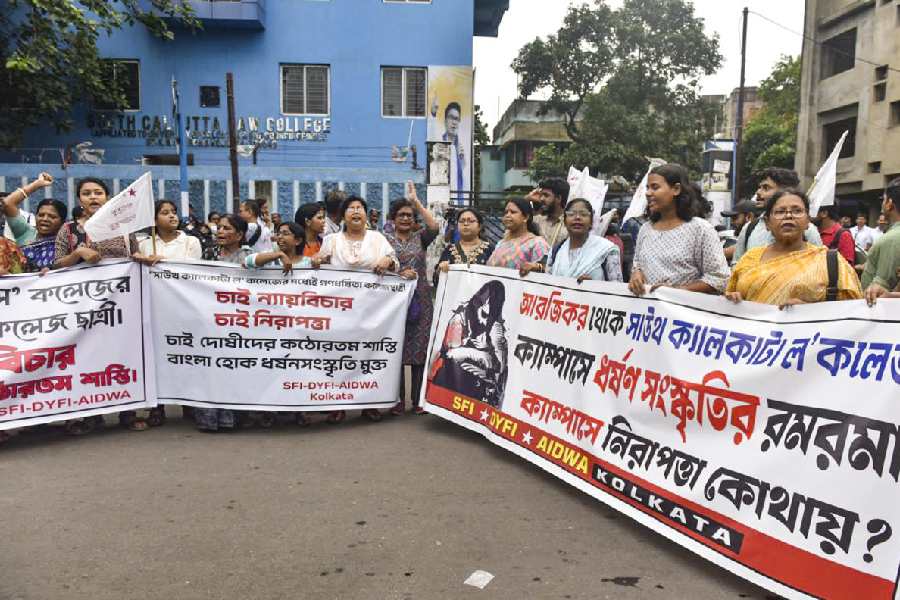Bharat Rashtra Samithi MLC K. Kavitha on Saturday called for “strong steps” to curb rising crimes against women, following the alleged gang-rape of a law student inside South Calcutta Law College in Kolkata.
“When K. Chandrashekar Rao was chief minister in Telangana, he launched an initiative called SHE Teams. Under this, men who teased girls were counselled and stopped before things could escalate,” she said. “This model proved to be effective and should be implemented across the country.”
SHE Teams were launched in Telangana in October, 2014 to ensure women’s safety and create a secure environment across Telangana. The teams, operating under the Women Safety Wing of Telangana Police, were designed to address sexual harassment and crimes against women through surveillance, swift intervention, and public awareness.
By their tenth anniversary in 2024, the SHE Teams had addressed over 66,000 petitions, filed more than 6,300 FIRs, and resolved over 17,000 petty cases. The presence of SHE Teams has been credited with reducing street harassment and increasing women’s confidence in reporting crimes.
Within two days of the incident, Kolkata Police arrested three individuals — two current students and one former student of the college.
The incident has brought fresh attention to the Aparajita Women and Child (West Bengal Criminal Laws Amendment) Bill, 2024. Passed in the West Bengal Assembly in September last year, the bill is awaiting Presidential assent.
Named after the Sanskrit word for 'undefeated,' the bill was tabled 25 days after the rape and murder of a trainee doctor at RG Kar Medical College and Hospital. That case, which occurred inside the hospital premises, triggered protests across the state and called for legal reform.
The Aparajita Bill proposes amendments to the Bharatiya Nyay Sanhita, 2023, the Bharatiya Nagarik Suraksha Sanhita, 2023, and the Protection of Children from Sexual Offences (POCSO) Act, 2012, in their application to West Bengal. It introduces stricter punishment for rape, including capital punishment if the victim dies or is left in a vegetative state.
For all other rape convictions, including gang rape, it prescribes either life imprisonment for the convict’s natural life or the death penalty, significantly reducing judicial discretion in sentencing.
Bengal also has 47 women police stations, including nine under the Kolkata Police's jurisdiction.
The Bharatiya Nyay Sanhita, 2023, which replaced the Indian Penal Code, mandates a minimum sentence of ten years for rape, which may extend to life imprisonment. The death penalty under BNS is reserved for cases where the victim dies or suffers permanent damage. The Aparajita Bill takes a harder stance, treating all rape cases with the maximum possible punishment.
The bill also includes a provision that investigations in rape cases must be completed within 21 days, extendable by 15 days with written approval. It mandates that trials be concluded within 30 days. Under the central law, the time frame for completing both investigation and trial is 60 days. The bill aims to speed up the justice process by setting tighter deadlines.
The bill introduces victim-centric reforms. It bans the use of the two-finger test during medical examinations, ensures free medical treatment for survivors, and includes a victim compensation mechanism. It also enhances punishment for police officers and public servants who delay investigations or tamper with evidence — up to 10 years of imprisonment in such cases.
Recognising the vulnerability of women working night shifts, especially in hospitals like R.G. Kar, where the 2024 case occurred, the bill mandates the installation of CCTV cameras and other safety mechanisms in public institutions and workplaces.
The Aparajita bill received support from both the Trinamool Congress and the Bharatiya Janata Party in the state assembly. Yet, despite the bipartisan backing and public pressure, the bill remains in limbo.
Under Article 254(2) of the Constitution, any state law that conflicts with a central law requires the President’s assent to take effect. West Bengal’s government has repeatedly urged the Centre to clear the bill. Andhra Pradesh and passed a similar bill in 2019, which has also been awaiting approval from the President.
Trinamool has blamed the BJP for delay in the bill getting the President's nod.
Shashi Panja, the state industries minister and a Trinamool spokesperson, asked why the Centre had not cleared the Aparajita Bill passed by the Bengal Assembly which was introduced after last year’s rape and murder at the RG Kar medical college and hospital to fast-track cases of crime against women.
“The BJP is only interested in politicising such cases. They have no sympathy for the victims. A woman’s body is not a political battlefield,” she said on Friday.
Legal experts and rights activists have raised concerns about certain provisions of the bill. Critics argue that mandating the death penalty or life imprisonment without parole for all rape cases might not lead to justice but could result in increased violence against victims, including murder, to destroy evidence. There are also questions about whether the fast-track deadlines are feasible given the shortage of judges, forensic experts, and support infrastructure.
The state’s ruling party maintains that the new law is necessary. In the wake of the latest case, Trinamool Congress leaders have reiterated the demand for immediate Presidential clearance. BJP leaders, on the other hand, have accused the state police of inaction and called the incident another example of the law and order breakdown in Bengal.
When The Telegraph Online reached out to Bengal minister Chandrima Bhattacharya for a response to K. Kavitha’s comment, she did not answer the call.










